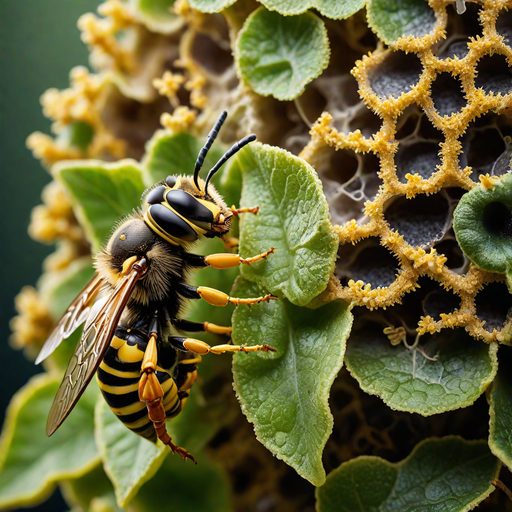
Bacteria Trick Wasps into an All-Female Future
Recommended for Biology
In the intricate world of insects, a microscopic drama unfolds, one where bacteria manipulate their hosts in a dance of survival and reproduction. Our protagonist, the bacterium Wolbachia, is a master manipulator, known for its ability to twist the fate of its insect hosts. But in the case of the Encarsia formosa wasp, has Wolbachia gone too far?
What is Wolbachia?
A type of bacteria commonly found in insects, influencing their reproduction.
How does Wolbachia manipulate its hosts?
It favors the production of female offspring, sometimes through extreme measures.
Why is the Encarsia formosa wasp important?
It's a natural enemy of whiteflies, a major agricultural pest.
The Puppet Master Within
Imagine a puppeteer pulling strings, controlling the movements of its marionette. In a similar fashion, Wolbachia orchestrates the reproductive fate of its insect hosts. This bacterium, found in the cells of countless insects, has a sinister agenda: to ensure its own survival by biasing the sex ratio towards females.
Wolbachia is passed down from mother to offspring through the egg. The males, however, are dead ends for the bacteria, as they cannot transmit it further. This creates a conflict of interest, with Wolbachia seeking to maximize female offspring, even at the cost of male survival.
The Encarsia formosa wasp, a tiny parasitoid of whiteflies, has fallen victim to Wolbachia’s manipulations. In a shocking twist, researchers have discovered that Wolbachia has completely eliminated males from wild populations of this wasp. The females, now the sole survivors, have become mere vessels for the bacteria’s propagation.
The Vanishing Act of the Males
Insects, like ants, bees, and wasps, usually have a straightforward sex-determination system: fertilized eggs become females, while unfertilized eggs become males. But in the case of Encarsia formosa, something strange is happening. Even unfertilized eggs are developing into females, leaving scientists scratching their heads.
The mystery deepened when researchers treated female wasps with antibiotics. Suddenly, male offspring appeared. This suggested that Wolbachia was somehow suppressing male development, and the antibiotic treatment was disrupting its control.
The answer to this puzzle lay in a stolen gene. Wolbachia, it turns out, had pilfered a gene called “tra” from a beetle, a gene responsible for promoting female development. By hijacking this gene, Wolbachia gained the power to manipulate the sex of its wasp host, ensuring the production of females and its own survival.
An Evolutionary Dead End?
While Wolbachia’s manipulation ensures its own survival in the short term, it may have dire consequences for the wasp. Without males, the wasp population loses genetic diversity and becomes vulnerable to extinction. It’s like a house of cards, precariously balanced on a single genetic foundation.
The absence of males also means no sexual reproduction, which is essential for purging harmful mutations from the gene pool. Over time, these mutations accumulate, like a ticking time bomb, threatening the wasp’s survival.
But hope is not entirely lost. Some researchers believe that Wolbachia may occasionally allow a few males to emerge, providing a brief window for sexual reproduction and genetic exchange. This could be a desperate attempt by the bacteria to prevent its own extinction.
The End of the Line or a New Beginning?
The story of Wolbachia and the Encarsia formosa wasp is a cautionary tale of manipulation and the delicate balance of nature. It reminds us that even the smallest organisms can wield immense power, shaping the evolutionary trajectory of their hosts.
Will the wasp succumb to Wolbachia’s control, or will it find a way to break free from its parasitic grasp? Only time will tell. But one thing is certain: the story of this wasp and its microbial puppeteer is a fascinating glimpse into the complex and often surprising world of insect-bacteria interactions.
Watch a video
Meet Wolbachia: The master manipulator of the insect world.
Curious Times is a leading newspaper and website for kids. We publish daily global news aligned to your learning levels (also as per NEP 2020): Foundational, Preparatory (Primary), Middle and Senior. So, check out the News tab for this. We bring kids’ favourite Curious Times Weekly newspaper every weekend with top news, feature stories and kids’ contributions. Check out daily JokesPoke, Tongue Twisters, Word of the Day and Quote of the Day, kids need it all the time.
ME – My Expressions at Curious Times is your place to get your work published, building your quality digital footprint. And it is a good way to share your talent and skills with your friends, family, school, teachers and the world. Thus, as you will step into higher educational institutes your published content will showcase your strength.
Events, Quizzes and Competitions bring students from over 5,000 schools globally to participate in the 21st-Century themes. Here schools and students win certificates, prizes and recognition through these global events.
Sign-up for your school for FREE!
Communicate with us: WhatsApp, Instagram, Facebook, Youtube, Twitter, and LinkedIn
0 (Please login to give a Curious Clap to your friend.)
